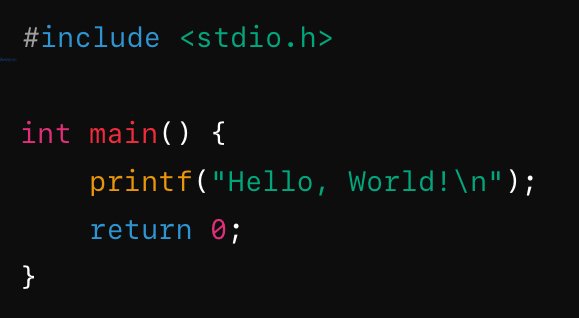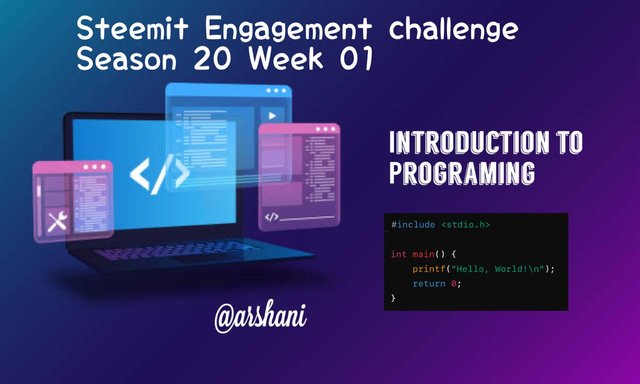Basic programming course: Lesson #1 - Introduction to programming
What's up guys? 😍. It's my great pleasure to take part in this week Engagement challenge organized by @alejos7ven.
Task 1. Describe in your own words an algorithm of some activity you do daily.
Algorithms are methodical processes or equations used to accomplish tasks or solve problems. Consider algorithms as recipes: just as a recipe gives you step-by-step instructions on how to prepare a dish, an algorithm offers instructions on how to accomplish a particular task, like sorting a list of numbers or determining the quickest route between two points. Algorithms are employed in anything from basic computations to sophisticated data processing and machine learning, and their complexity can vary greatly. They are the basis of computer science and are necessary to develop productive and successful systems and software.
To begin a daily workout regimen:
- Get up early.
- Stretch to get warmed up.
- Engage in cardio for thirty minutes, such as running.
- Perform strength-training activities, such as squats and push-ups.
- Stretch to relieve tension.
- Eat a balanced post-workout meal and stay hydrated.
Above algorithm shows how I begin a daily workout regimen.
Task 2. What is the importance of programming languages in the world? How do they help us?
Programming languages are essential to innovation and current technologies. They provide as the basis for developing the systems, apps, and software that run everything from enterprise-level software solutions to cellphones. With the unique qualities of each language, developers may effectively solve a wide range of challenges. For example, Python is preferred due to its ease of use and adaptability, whereas C++ is well-known for its efficiency in system-level applications.
Language selection can have an impact on maintainability, system performance, and development speed. Furthermore, programming languages have a huge impact on daily life and industry, propelling the development of sectors like web development, data science, and artificial intelligence. As a result, they play a crucial role in advancing technology and forming the digital landscape.
The fundamental tools that let us teach computers how to do tasks are programming languages. They transfer human logic into machine-readable code, simplifying the development of software applications, automation of repetitive operations, and data management. Programming languages enable us to handle complicated problems in a variety of fields, including business, engineering, science, and entertainment. They also help us be more creative and productive. They are essential to the development of technology and the digital revolution.
Task 3. What do you need while programming?
A few essentials are usually needed when We programming:
🔅An Integrated Development Environment (IDE) such as PyCharm, IntelliJ IDEA, Visual Studio Code, or other code editors is referred to as a development environment.
🔅The particular language you're using, such as Python, Java, JavaScript, etc., is called a programming language.
🔅 Libraries and frameworks: Depending on the requirements of your project, these are pre-written code and tools that speed up development.
🔅A well-defined strategy is knowing what you want to construct and segmenting it into doable steps.
🔅Documentation: Having access to pertinent resources and documentation to consult as you code. Tools for writing and executing tests to make sure your code functions as intended are called testing tools.
🔅Version control: Organize and monitor changes in your codebase using tools such as Git.
🔅Debugging Tools: Methods and instruments for locating and resolving coding bugs.
🔅Effective Problem-Solving Skills: The capacity to troubleshoot and use logic to get beyond obstacles.
🔅Maintaining focus and patience is crucial when programming, as it may be a challenging and intricate process.
Task 4. Write your first "Hello world!" Using pseudo-code.
Here is my first Hello World program,
#include<stdio.h>
int main() {
printf("Hello, World!/n");
return 0;
}

Screenshot was taken from my laptop screen
• This is a straightforward hello world C program. Include the standard input/output library in this program by using #include.
• The primary function that initiates execution is defined by int main().
• printf("Hello, world!\n"); the console is printed with "Hello, world!" return 0; denotes a successful program completion.
This program can be run by saving it to a file with a.c extension (hello.c, for example), compiling it with a C compiler such as gcc, and then running the compiled program.
Conclusion
Programming is an effective tool for coming up with novel solutions to challenging issues. By enabling people to create software, automate processes, and analyze data, it promotes efficiency and technical innovation. Learning to program improves one's ability to solve problems and leads to a variety of job options in a quickly developing profession.
Finally I would like to invite @solaymann, @event-horizon and @enamul17 to take part in this interesting contest.
Thank you for giving a time!


My Tweeter share,
https://x.com/arshani129/status/1834267749737996685
!upvote 20
💯⚜2️⃣0️⃣2️⃣4️⃣ Participate in the "Seven Network" Community2️⃣0️⃣2️⃣4️⃣ ⚜💯.
This post was manually selected to be voted on by "Seven Network Project". (Manual Curation of Steem Seven).
the post has been upvoted successfully! Remaining bandwidth: 60%
the post has been upvoted successfully! Remaining bandwidth: 60%